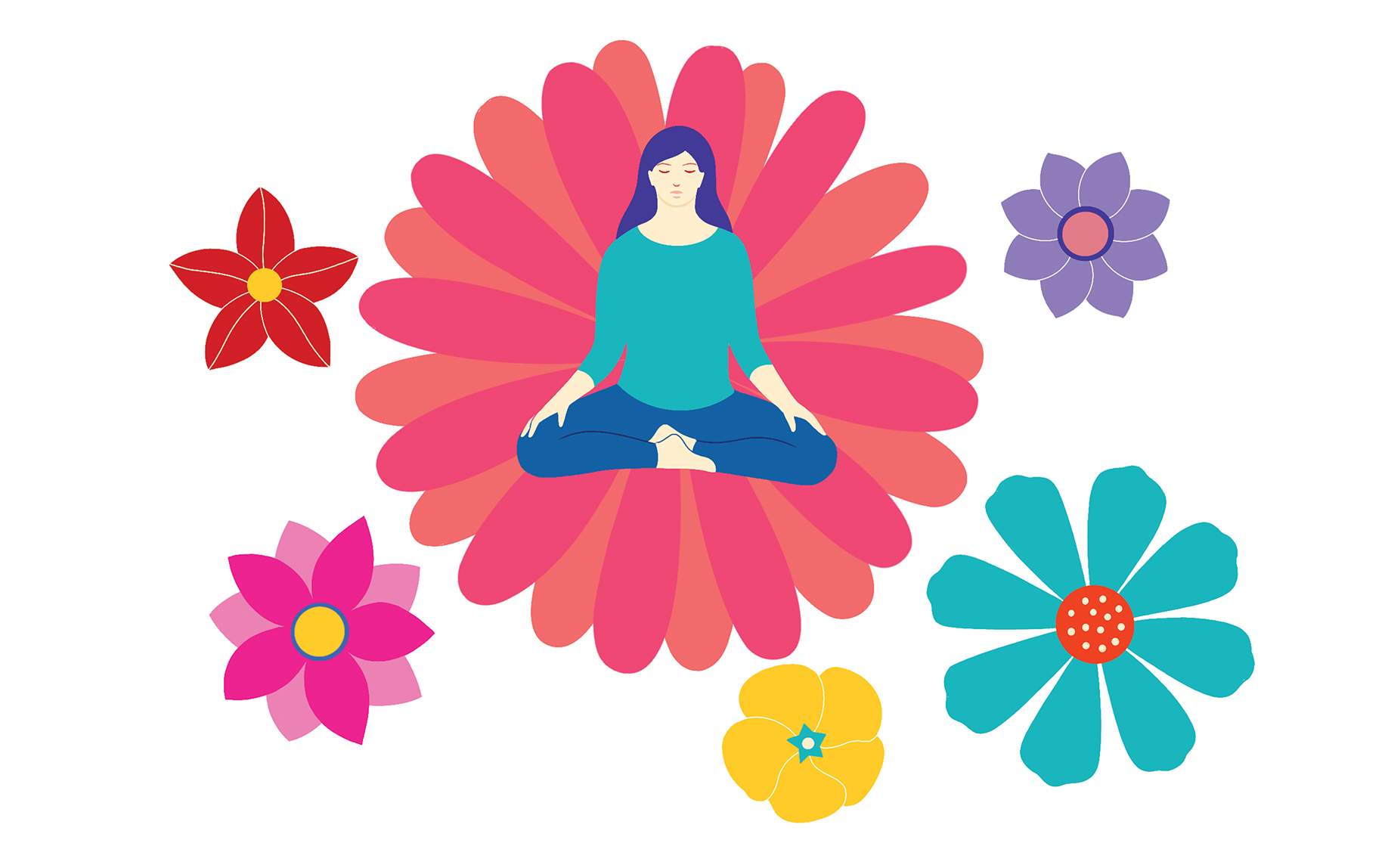I’ve been making a dream board with my work colleagues for 30 years. In case you’re new to the concept, a dream board consists of all one’s goals, both personal and professional, in the form of photos and magazine clippings, arranged on a piece of cardboard. I also turn my dream board into my screensaver, so my goals and intentions are with me always.
While I am continually amazed at how these visual collages seem to focus my mind on what I aim to achieve—from tangible goals like a new sofa or a meditation retreat, to new and ideal clients, revenue goals, and increasing my hiking endurance—I have a new idea.
What about making a dream board with a counterintuitive intention: I want to have a joyous and fulfilling life, even if none of my current intentions are realized? What if I am already enough?
See, I have an aversion to setbacks. (I’ve tried seeing setbacks as learning opportunities, but my mind doesn’t buy that idea.) So, whether I achieve my goals or hit roadblocks along the way, I’d like to cultivate a mind that’s friendlier, calmer, and more resilient amidst the storms.
Here’s the culmination of what I’ve learned in my 30 years of financial advising and meditation practice about priming the mind for success, independent of what happens to us or what we achieve.
7 Powerful Ways to Prime Your Mind for Success
1) Remember that you are enough
The idea of feeling enough, doing enough, having enough, and being enough as you are might feel limiting, but it’s an antidote to greed and fear. “Enough” may sound boring, but it’s actually a boundless idea. When we’re not striving for more or to improve ourselves, we can more easily rest in our parasympathetic nervous system, which helps us digest and rest, and gets activated when we feel safe. (This is in contrast to the sympathetic nervous system, which controls our fight-or-flight response when we feel threatened.) When we’re OK with who we are and what we have, when we’re not in the fight-or-flight mode of striving, we trigger the parasympathetic nervous system, which tells the body that we’re safe to physically and mentally relax. And I’ve found that, when we relax, we’re more likely to discern financial opportunities, charge appropriately for our services, or make wiser decisions.
Here are a few ways to tap into this feeling of enough:
- Create more space buffers in your calendar, like scheduling meetings to end 10 minutes before the top of the hour. See those space buffers as commitments to your Enough Project.
- Start telling people about the ways in which you’re feeling spacious, instead of how you’re stressed and overwhelmed.
- Remind yourself how much you’ve grown over the past five years—in terms of emotional intelligence and equanimity. As you contemplate your growth, see if it is possible to recognize that even if your growth stopped, you’re enough!
Even in our modern culture where no one believes they have enough of anything, enough is accessible right now. Since no one has ever arrived in this contented place of enough by chasing after more, why not let go of grasping for more and start living our lives as if we have enough right now? How would you show up at work and at home if you realized that you are enough?
2) Investigate your beliefs
From this foundation of knowing that you are enough, ask yourself: What do I believe about money? What did I hear my parents/caretakers saying about money? As I have gained awareness of my own money beliefs, such as “money is difficult,” I have gained perspective from them. The problem is not our beliefs about money or success; it’s how we cling to these beliefs. Sit in silence and ask yourself: How would I relate to money and success if I had inherited the opposite money belief? What was my definition of success growing up, and what is my current definition of success? (These definitions don’t need to include money.) It takes courage for us to see the beliefs that we are holding onto.
Whether your belief is that you should spend/save everything, that more money brings more security and happiness, or that mindful people don’t need to worry about money, you have the ability to discern other beliefs, including those antithetical to your own. The more we can befriend these beliefs and not try to eliminate them, the more likely we are to create a more fruitful relationship with these beliefs.
3) Feed kindness instead of envy, striving, and comparison
Our minds envy, strive, and compare as often as our mouths make saliva. These three things rob us of our joy, and joy is a precursor to every kind of success. We are least present when we envy what others have, and we are most present when we appreciate what others have. Can you think of a person who you typically feel envious of or compare yourself to? See this person in your mind’s eye, and wish that this person may flourish even more than they already do. This is the counterintuitive energy we need to cut through the barbed wire of envy that chokes off our joy.
4) Mentor someone
When you mentor someone, you send a message to your brain that you are being generous, and the brain assumes “I must be OK because I have an overflow of resources.” Yes, you can also cultivate generosity by giving dollars, but I have found that mentorship elevates confidence very effectively.
5) Spread awareness
When we have the inevitable setback this year, we’re likely to narrow our aperture and overlook the bigger picture. Next time you find yourself experiencing a setback, try this short practice:
- Realize that the setback is temporary, even though the mind might believe that the pain is permanent.
- Notice that your awareness has narrowed. So, step outdoors and allow your peripheral vision to spread in all directions for a few minutes.
- When you return indoors, sit, close your eyes and imagine your awareness spreading out in all six directions (the space in front of you, to the right of you, behind you, to the left of you, above you and below you).
- After you open your eyes, name the parts of your life that are unaffected or may even benefit from this setback.
6) Know your numbers
Many of us avoid our personal (financial) numbers, even those with MBAs. When we acknowledge this avoidance, and instead turn toward our numbers with awareness, we can be with the truth of our finances, instead of a story about them. Maybe things are worse or better than we imagine; it’s important to know. A brain that knows the truth will be less fearful and more supple and insightful. Engagement with your numbers will set you free. Know the range of your monthly expenses and after-tax income (as well as an income level that feels sufficient if current income doesn’t). Know the amounts you have in retirement and non-retirement accounts. During the pandemic, some have awakened to the possibility that spending less means they can earn less or retire sooner.
7) Awaken gratitude for your self-worth
Focus on your inner wealth: your skills, your health, your future years of working and offering your gifts, your relationships, your network, your wisdom and ability to discern new perspectives, your sense of humor, your ability to love and appreciate others, your six senses, including thought. Reflect on the priceless nature of your self-worth relative to the limited nature of your net worth. Do this at the beginning or end of your day.
We can expand our minds with these practices so that whatever may happen, all is welcome. Our happiness need not depend on realizing our goals and intentions, because we have fully accepted that impermanence is here to stay and that an equanimous mind, not easily disturbed by anything good or bad, is more than enough. It’s everything.
read more
What We Know (Or Think We Know) About Happiness
When you don’t know what makes you happy, you can end up chasing illusions that only make you suffer. The secret to discovering happiness might be closer than you think.
Read More
Finding Joy in the Mundane Moments of Life
What happens when we look for the sublime in mundane tasks? Here are five ways to capture the beauty and connection available in even the most basic daily experiences.
Read More
The Power of Sustainable Self-Care
Shelly Tygielski explores how consistently showing up for yourself first lays the foundation for our life’s purpose—showing up for others—and how to create your own self-care practice.
Read More









